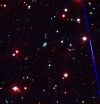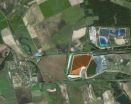(Press-News.org) Learning from competitors is a critically important form of learning for animals and humans. A new study has used brain imaging to reveal how people and animals learn from failure and success.
The team from Bristol University led by Dr Paul Howard-Jones, Senior Lecturer in Education in the Graduate School of Education and Dr Rafal Bogacz, Senior Lecturer in the Department of Computer Science, scanned the brains of players as they battled against an artificial opponent in a computer game.
In the game, each player took turns with the computer to select one of four boxes whose payouts were simulating the ebb and flow of natural food sources.
Players were able to learn from their own successful selections but those of their competitor failed completely to increase their neural activity. Instead, it was their competitor's unexpected failures that generated this additional brain activity. Such failures generated both reward signals in the brains of the players, and learning signals in regions involved with inhibiting response. This suggests that we benefit from our competitors' failures by learning to inhibit the actions that lead to them.
Surprisingly, when players were observing their competitor make selections, the players' brains were activated as if they were performing these actions themselves. Such 'mirror neuron' activities occur when we observe the actions of other humans but here the players knew their opponent was just a computer and no animated graphics were used. Previously, it has been suggested that the mirror neuron system supports a type of unconscious mind-reading that helps us, for example, judge others' intentions.
Dr Howard-Jones added: "We were surprised to see the mirror neuron system activating in response to a computer. If the human brain can respond as though a computer has a mind, that's probably good news for those wishing to use the computer as a teacher."
INFORMATION:
The findings of the study are revealed in a paper published online by the journal – NeuroImage.
I win, you lose: Brain imaging reveals how we learn from our competitors
What's on your computer's mind?
2010-10-14
ELSE PRESS RELEASES FROM THIS DATE:
Life expectancy higher in Israel than in US, according to Ben-Gurion U. researcher
2010-10-14
BEER-SHEVA, ISRAEL, October 13, 2010 — A new study conducted by a researcher at Ben-Gurion University of the Negev (BGU) for Jerusalem's Taub Center for Social Policy Studies in Israel reports that Israeli's have a higher life expectancy on average than Americans and residents of other OECD (Organization for Economic Cooperation and Development) countries.
According to the most recent data, from 2005, the average American life expectancy is now 78 years; for Israeli Jews, approximately 81 years and Israeli Arabs, 79 years. Japan has the highest life expectancy of OECD ...
Train a computer to classify pictures and videos based on the elements that they contain
2010-10-14
University of Granada researchers have developed a new computer technique that allows to "train" computers to interpret the visual contents of a video or picture. This advance will allow to classify automatically pictures basing on whether individuals or specific objects are present in such images. Videos can also be classified according to specific poses.
At present, computer search and classification of images is made basing on the name of the file, folder or on features as date or size, but the visual information contained was never used for classification purposes. ...
Study demonstrates pine bark naturally improves tinnitus
2010-10-14
HOBOKEN, N.J. (Sept. 13, 2010) – More than 50 million Americans will experience some degree of tinnitus in their lifetime, according to the American Tinnitus Association. Tinnitus is a hearing condition that causes the constant misperception of sound, including hissing, ringing and rushing noises. A study recently published in Panminerva Medica reveals that Pycnogenol® (pic-noj-en-all), an antioxidant plant extract derived from the bark of the French maritime pine tree, is effective in relieving tinnitus symptoms by improving blood flow in the inner ear.
"Impaired blood ...
Biopharma leaders to reveal successful strategies for China, India at the PharmAsia Summit
2010-10-14
San Francisco, Calif., 13 October, 2010 - Elsevier Business Intelligence, publisher of PharmAsia News, IN VIVO and "The Pink Sheet," today announced the agenda for Windhover's 2nd PharmAsia Summit (Oct. 25-26). This year's Summit will bring top biopharma leaders from Asia and the U.S. to San Francisco to share what works and what doesn't in China, India, Japan and the Pacific Rim.
At the PharmAsia Summit, you'll hear Asia strategies and case studies from industry leading experts on dealmaking, commercial strategy, outsourcing, regulatory risks, IP protection, and pricing ...
Early role of mitochondria in AD may help explain limitations to current beta amyloid hypothesis
2010-10-14
(NEW YORK, NY, October 13, 2010) – Before Alzheimer's patients experience memory loss, the brain's neurons have already suffered harm for years.
A new study in mouse models by researchers at Columbia University Medical Center has found that the brain's mitochondria -- the powerhouses of the cell -- are one of the earliest casualties of the disease. The study, which appeared in the online Early Edition of PNAS, also found that impaired mitochondria then injure the neurons' synapses, which are necessary for normal brain function.
"The damage to synapses is one of the ...
National study shows 1 in 5 children meet criteria for a mental disorder across their lifetime
2010-10-14
Washington, DC, 13 October 2010 - Mental disorders in children are often difficult to identify due to the myriad of changes that occur during the normal course of maturation. For the first time, researchers at the National Institute of Mental Health have reported on the prevalence data on a broad range of mental disorders in a nationally representative sample of U.S. adolescents, which show that approximately one in five children in the U.S. meet the criteria for a mental disorder severe enough to disrupt their daily lives.
The prevalence of the mental health disorders ...
Ghosts of the future
2010-10-14
Astronomers using the South Pole Telescope report that they have discovered the most massive galaxy cluster yet seen at a distance of 7 billion light-years. The cluster (designated SPT-CL J0546-5345) weighs in at around 800 trillion Suns, and holds hundreds of galaxies.
"This galaxy cluster wins the heavyweight title. It's among the most massive clusters ever found at this distance," said Mark Brodwin, a Smithsonian astronomer at the Harvard-Smithsonian Center for Astrophysics. Brodwin is first author on the paper announcing the discovery, which appeared in the Astrophysical ...
Compound in celery, peppers reduces age-related memory deficits
2010-10-14
CHAMPAIGN, lll. — A diet rich in the plant compound luteolin reduces age-related inflammation in the brain and related memory deficits by directly inhibiting the release of inflammatory molecules in the brain, researchers report.
Luteolin (LOOT-ee-oh-lin) is found in many plants, including carrots, peppers, celery, olive oil, peppermint, rosemary and chamomile.
The new study, which examined the effects of dietary luteolin in a mouse model of aging, appears in the Journal of Nutrition.
The researchers focused on microglial cells, specialized immune cells that reside ...
Can Hungary's red sludge be made less toxic with carbon?
2010-10-14
BLOOMINGTON, Ind. -- The red, metal-laden sludge that escaped a containment pond in Hungary last week could be made less toxic with the help of carbon sequestration, says an Indiana University Bloomington geologist who has a patent pending on the technique.
The bauxite residue now covers 40 square kilometers south of the Danube River, and has caused the deaths of eight Hungarians and injured at least 150. The residue also has caused the extinction of life in a local river and as yet unknown environmental damage elsewhere. While human deaths in the wake of the disaster ...
Hemostatic powder stops bleeding ulcers: Doctor
2010-10-14
TORONTO, Ont., October 13, 2010 — A new material similar to that used by the U.S. Military to treat traumatic injuries is showing promise as the next novel treatment for bleeding ulcers, a condition that commonly affects up to 15 per cent of adults, according to Hong Kong physician Dr. James Lau.
Dr. Lau is presenting his findings today on this world-first research at the 23rd International Course on Therapeutic Endoscopy. The course is a world-renowned international conference on the latest innovations in endoscopy organized and hosted by St. Michael's Hospital.
"Nearly ...
LAST 30 PRESS RELEASES:
Cannabis compounds show promise in fighting fatty liver disease
Study in mice reveals the brain circuits behind why we help others
Online forum to explore how organic carbon amendments can improve soil health while storing carbon
Turning agricultural plastic waste into valuable chemicals with biochar catalysts
Hidden viral networks in soil microplastics may shape the future of sustainable agriculture
Americans don’t just fear driverless cars will crash — they fear mass job losses
Mayo Clinic researchers find combination therapy reduces effects of ‘zombie cells’ in diabetic kidney disease
Preventing breast cancer resistance to CDK4/6 inhibitors using genomic findings
Carbon nanotube fiber ‘textile’ heaters could help industry electrify high-temperature gas heating
Improving your biological age gap is associated with better brain health
Learning makes brain cells work together, not apart
Engineers improve infrared devices using century-old materials
Physicists mathematically create the first ‘ideal glass’
Microbe exposure may not protect against developing allergic disease
Forest damage in Europe to rise by around 20% by 2100 even if warming is limited to 2°C
Rapid population growth helped koala’s recovery from severe genetic bottleneck
CAR-expressing astrocytes target and clear amyloid-β in mouse model of Alzheimer’s disease
Unique Rubisco subunit boosts carbon assimilation in land plants
Climate change will drive increasing forest disturbances across Europe throughout the next century
Enhanced brain cells clear away dementia-related proteins
This odd little plant could help turbocharge crop yields
Flipped chromosomal segments drive natural selection
Whole-genome study of koalas transforms how we understand genetic risk in endangered species
Worcester Polytechnic Institute identifies new tool for predicting Alzheimer’s disease
HSS studies highlight advantages of osseointegration for people with an amputation
Buck Institute launches Healthspan Horizons to turn long-term health data into Actionable healthspan insights
University of Ottawa Heart Institute, the University of Ottawa and McGill University launch ARCHIMEDES to advance health research in Canada
The world’s largest brain research prize awarded for groundbreaking discoveries on how we sense touch and pain
Magnetofluids help to overcome challenges in left atrial appendage occlusion
Brain-clearing cells offer clues to slowing Alzheimer’s disease progression
[Press-News.org] I win, you lose: Brain imaging reveals how we learn from our competitorsWhat's on your computer's mind?



